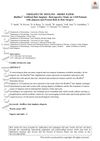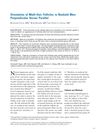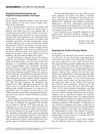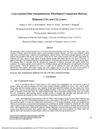 18 citations,
November 2016 in “Journal of Oral and Maxillofacial Surgery”
18 citations,
November 2016 in “Journal of Oral and Maxillofacial Surgery” Platelet-Rich Plasma (PRP) treatment can potentially increase hair density and quality in people with hair loss, but more research is needed to confirm its effectiveness.
 8 citations,
July 2021 in “Patient Preference and Adherence”
8 citations,
July 2021 in “Patient Preference and Adherence” Alopecia treatments improve life quality but side effects can lessen this benefit; better use of quality of life measures is needed.
 164 citations,
January 2014 in “Journal of Cutaneous and Aesthetic Surgery”
164 citations,
January 2014 in “Journal of Cutaneous and Aesthetic Surgery” PRP injections increase hair density and satisfaction in androgenetic alopecia patients.
 31 citations,
October 2017 in “Dermatologic Surgery”
31 citations,
October 2017 in “Dermatologic Surgery” Hair transplants look natural, but the best method is debated, and PRP shows promise for hair regrowth.
 1 citations,
July 2007 in “Regenerative Medicine”
1 citations,
July 2007 in “Regenerative Medicine” Stem cell research and regenerative medicine have made significant advancements in treating various diseases and conditions.
 April 2020 in “Journal of Cosmetic and Laser Therapy”
April 2020 in “Journal of Cosmetic and Laser Therapy” Optimal transplant density for Chinese male hair loss patients is 35-50 hair/cm², with minimum 106.88 hair/cm² left in donor area for esthetic satisfaction.
 8 citations,
February 2020 in “Aesthetic Surgery Journal”
8 citations,
February 2020 in “Aesthetic Surgery Journal” Adding cells to fat grafts improves hair regrowth in early baldness, but effects lessen over time.
 July 2023 in “International Journal of Cosmetic Science”
July 2023 in “International Journal of Cosmetic Science” Biopolymers are increasingly used in cosmetics for their non-toxicity and skin benefits, with future biotech advancements likely to expand their applications.
 January 2024 in “Photodiagnosis and Photodynamic Therapy”
January 2024 in “Photodiagnosis and Photodynamic Therapy” Using minoxidil with laser therapy is more effective for female hair loss than minoxidil alone.
May 2024 in “International journal of molecular sciences” Platelet-derived products help regenerate tissue and are used in various skin and hair treatments.
 1 citations,
January 2022 in “Faculty reviews”
1 citations,
January 2022 in “Faculty reviews” The best long-lasting results in treating hair loss may be achieved through combination therapy, including treatments like finasteride, minoxidil, and platelet-rich plasma injections.
 31 citations,
August 2019 in “Regenerative Medicine”
31 citations,
August 2019 in “Regenerative Medicine” Human placenta hydrogel helps restore cells needed for hair growth.
 January 2023 in “Skin appendage disorders”
January 2023 in “Skin appendage disorders” Scalp microinfusion is a new method for treating hair loss that shows promise but needs more research for standardization.
 January 2025 in “Journal of Cutaneous and Aesthetic Surgery”
January 2025 in “Journal of Cutaneous and Aesthetic Surgery” Low-level laser therapy effectively improves hair growth in androgenetic alopecia with minimal side effects.
 January 2023 in “Journal of Cosmetics, Dermatological Sciences and Applications”
January 2023 in “Journal of Cosmetics, Dermatological Sciences and Applications” The hair growth serum Trichosera® was effective in increasing hair regrowth and density and reducing hair fall without significant side effects.
 August 2023 in “Journal of analytical & pharmaceutical research”
August 2023 in “Journal of analytical & pharmaceutical research” Microneedle-assisted therapy with human basic fibroblast growth factor significantly regrew hair in patients with hair loss.

Certain natural products may help stimulate hair growth by affecting stem cell activity in the scalp.
 August 2023 in “European Journal of Plastic Surgery”
August 2023 in “European Journal of Plastic Surgery” 3D bioprinting is advancing in plastic and reconstructive surgery, especially for creating tissues and improving surgical planning, but faces challenges like vascularization and material development.
 4 citations,
April 2021 in “Journal of Cosmetic Dermatology”
4 citations,
April 2021 in “Journal of Cosmetic Dermatology” Intradermal injections improve hair density and thickness better, while derma roller is more convenient.
 3 citations,
June 2019 in “Dermatologic Therapy”
3 citations,
June 2019 in “Dermatologic Therapy” Biofibre hair implant is a safe, effective treatment for baldness with 95% patient satisfaction.
 November 2018 in “Hair transplant forum international”
November 2018 in “Hair transplant forum international” The article suggests that hair transplant surgery may not be purely cosmetic because it treats a disease and calls for clearer guidelines on its classification.
 14 citations,
September 2001 in “Dermatologic Surgery”
14 citations,
September 2001 in “Dermatologic Surgery” The document concludes that following specific surgical guidelines can improve scalp surgery results and reduce complications.
 April 2016 in “Journal of Aesthetic Nursing”
April 2016 in “Journal of Aesthetic Nursing” The letter concludes that the aesthetics sector needs better regulation and higher-level training to ensure patient safety.
 3 citations,
January 2015 in “Social Science Research Network”
3 citations,
January 2015 in “Social Science Research Network” The conclusion is that off-label drug use can lead to important medical discoveries and improve patient care.
 8 citations,
July 2008 in “Facial Plastic Surgery Clinics of North America”
8 citations,
July 2008 in “Facial Plastic Surgery Clinics of North America” More men are getting non-surgical cosmetic treatments due to increased income and social acceptance, with less invasive options being preferred.
 68 citations,
January 2007 in “Journal of Cosmetic and Laser Therapy”
68 citations,
January 2007 in “Journal of Cosmetic and Laser Therapy” Laser/light treatments for hair loss are popular but lack scientific data proving effectiveness.
 3 citations,
May 2006 in “Dermatologic Surgery”
3 citations,
May 2006 in “Dermatologic Surgery” Most men's multi-hair follicles naturally stand perpendicular to a line from the top of their head, which is important for natural-looking hair transplants.
 September 2001 in “Dermatologic Surgery”
September 2001 in “Dermatologic Surgery” Scalp surgery guidelines ensure best cosmetic results and fewer complications.
 December 1999 in “Dermatologic Surgery”
December 1999 in “Dermatologic Surgery” Experts discussed sedation, hair transplant techniques, and called for respectful professional communication.
 June 1999 in “Proceedings of SPIE”
June 1999 in “Proceedings of SPIE” The CO₂ laser is better for hair transplantation because it causes less damage than the Ho:YAG laser.




























